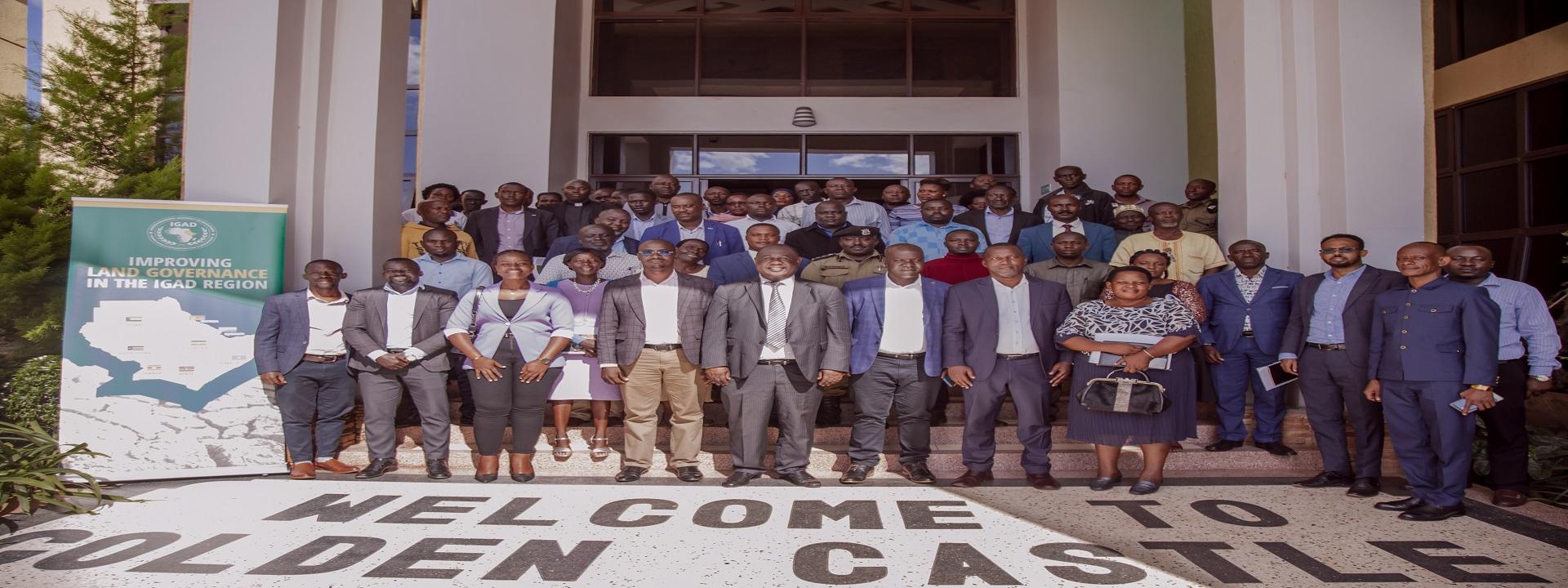November 21–22, 2024 (Golden Castle Hotel, Hoima – Uganda): As part of the review of Uganda’s National Land Policy (2013), the Intergovernmental Authority on Development (IGAD), through the Land Governance programme of its Agriculture and Environment Division, convened a two-day workshop for the Bunyoro and Rwenzori Cluster, Uganda. The workshop aimed to gather stakeholder perspectives and recommendations for incorporation into the draft revised National Land Policy and to consolidate these inputs for adoption and approval by the National Land Policy (NLP) Review Working Group.
This is the fourth event in a series of regional meetings, supported by IGAD, to be held across Uganda over a two-week period, ensuring participatory development of a revised national land policy. The gathering included technical experts from the Uganda Ministry of Lands, Housing, and Urban Development, a team of consultants responsible for creating the Land Issues Paper and the zero draft of the revised policy, as well as representatives from civil society organizations, Religious leaders, Resident District Commissioners, Cultural leaders, district officials from the 17 districts of the region, technical experts on land and natural resources from the districts and representatives from the sugar and oil sector.
At the opening session of the meeting, IGAD Head of Mission Joselyn Bigirwa, speaking on behalf of H.E. Dr. Workneh Gebeyehu, IGAD Executive Secretary, underscored IGAD’s core mandates of promoting peace and security and fostering economic integration. She stressed that addressing the root causes of conflict is essential to achieving these goals. IGAD is actively collaborating with member states to develop conflict-sensitive land policies and tools designed to prevent and resolve such conflicts. Furthermore, IGAD remains committed to inclusivity by ensuring the active participation of disadvantaged groups, including women, youth, persons with disabilities, and the wider community, in these initiatives.
The Deputy Resident City Commissioner of Hoima City, Mr. Muyambi Moses, highlighted that Land compensation remains a significant issue in the Bunyoro region, particularly due to the presence of oil, making the ongoing land policy review crucial for addressing challenges related to land acquisition and compensation. Land, being a scarce and expensive resource, often attracts conflicts, necessitating measures to streamline inheritance and succession procedures to protect vulnerable groups, such as widows, from being disinherited. Additionally, there are increasing levels of land grabbing, often targeting disadvantaged members of society and facilitated by corruption, hence the need for robust mechanisms to prevent and reduce corruption in land transactions.
At the closing session of the meeting, the Minister of State for Lands, Hon. Sam Mayanja, emphasized the need for the revised land policy to drive economic growth while protecting the rights of all Ugandans and addressing challenges that have emerged over the past decade. Land, as the bedrock of livelihoods, holds great significance, yet faces increasing disputes, land grabbing, the impacts of climate change, urban expansion, and the growing demand for infrastructure that the revised policy should propose solutions.
The meeting concluded successfully, with participants from the Bunyoro/Rwenzori region recommending the need to strengthen accountability and build the capacity of area land committees, while also addressing unfair compensation rates, which often lead to community resistance to government projects. They also proposed the adoption of leasehold arrangements for land used in projects like mining and oil and gas, rather than permanent acquisition, to protect community reversionary rights after the minerals are exhausted. Participants called for the government to expedite the identification and compensation of absentee landlords in areas such as Buyaga and Bugangaizi, while allowing financially capable tenants to process their own titles to address delays. They also recommended imposing taxes on idle land to enhance productivity and called for provisions compelling absentee landlords to sell to the government instead of individuals, thereby reducing land speculation and the creation of new absentee landlords. Finally, the participants proposed the creation of a special land compensation fund to be established at the district level to facilitate compensation for land acquired by districts for infrastructure projects.
The series of workshops across the country for the next two weeks is a testament of IGAD’s commitment through the support of Sweden and Uganda, to fostering a collaborative and inclusive process that guarantees the voices of all stakeholders are reflected in the revised Uganda National Land Policy.

